|
|
|
Sort Order |
|
|
|
Items / Page
|
|
|
|
|
|
|
| Srl | Item |
| 1 |
ID:
127343
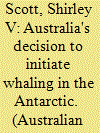

|
|
|
|
|
| Publication |
2014.
|
| Summary/Abstract |
On May 31, 2010, Australia instituted proceedings before the International Court of Justice in the case of Whaling in the Antarctic (Australia v. Japan). Although Australian politicians had for some time threatened such a course of action, the decision to proceed with international litigation took many observers by surprise, most basically because Japan appeared to be in a strong legal position and the risks associated with the case appeared greater than Australia's prospects for success. This article examines the background to the whaling dispute and suggests two ways in which litigation in the World Court may contribute to resolution of the dispute no matter the legal outcome of the case.
|
|
|
|
|
|
|
|
|
|
|
|
|
|
|
|
| 2 |
ID:
127354
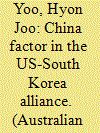

|
|
|
|
|
| Publication |
2014.
|
| Summary/Abstract |
Over the past 10 years, South Korea has chosen inconsistent strategies with respect to the US-South Korea alliance. On the one hand, Seoul disagreed with Washington about the extended role of United States Forces Korea and the deployment of US missile defence systems in East Asia. On the other hand, these problems ironically coincided with South Korea's strong support for the USA in operations in Afghanistan and Iraq. What explains the inconsistency of South Korea's alliance policies? Major schools of thought in international relations have offered explanations, but their analyses are deficient and indeterminate. This article looks at the South Korea-China-North Korea triangle as a new approach to explaining the puzzling behaviour of South Korea. The model shows that South Korea's alliance policies are driven by two causal variables. First, North Korea is an impelling force for South Korea to remain as a strong US alliance partner. This encourages Seoul to maintain cooperation with Washington in wide-ranging alliance tasks. Second, South Korea's policies are likely to reflect the way the nation perceives how useful China is in taming North Korea. The perceived usefulness of China causes Seoul to accommodate China and decrease cooperation with the USA. This might strain the relationship with the USA should South Korea evade alliance missions that might run contrary to China's security interests.
|
|
|
|
|
|
|
|
|
|
|
|
|
|
|
|
| 3 |
ID:
127345
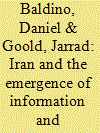

|
|
|
|
|
| Publication |
2014.
|
| Summary/Abstract |
This study examines the emergence of information and communications technology (ICT) in facilitating political protest in the Middle East, with a focus on the Iranian experience. With the rise of 'emancipating technology' to mobilise popular support, many had hoped that the incumbent regime in Iran would be steered towards a more democratic and less authoritarian path. At the same time, the Iranian regime itself has shown an increasingly sophisticated technical nous, constructing a centralised censorship network and using available technology to proliferate propaganda and control and subdue cyber-protest. As such, ICT has acted as a complex dual-edged sword in both mutually supporting and suppressing political activism in modern-day Iran.
|
|
|
|
|
|
|
|
|
|
|
|
|
|
|
|
| 4 |
ID:
127353
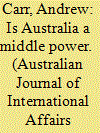

|
|
|
|
|
| Publication |
2014.
|
| Summary/Abstract |
This article examines whether Australia is a middle power. It identifies the three most popular approaches to defining a middle power: by a country's position, behaviour and identity. The article tests each definition against Australia, highlighting the strengths and weaknesses of each. Highlighting an earlier systemic approach to defining states, an alternative 'systemic impact' definition for middle powers is proposed. This approach, it is argued, provides a more comprehensive manner for identifying whether a country like Australia is a middle power, along with the implications for international security.
|
|
|
|
|
|
|
|
|
|
|
|
|
|
|
|
| 5 |
ID:
127356


|
|
|
|
|
| Publication |
2014.
|
| Summary/Abstract |
Allwars produce their own lessons, but fewwars yield a consensus as towhat those lessons should be. So it is with America's 2003 invasion of Iraq. The immediate consensus surrounding this conflict was that the war was mismanaged and poorly prosecuted. There has been no shortage of books documenting the folly of the Bush administration in this regard.1 Such books often focus on the alleged architects of the Iraq War, from George W. Bush and Dick Cheney to the much maligned neoconservative intellectuals huddled around the Project for a New American Century and writing for the Weekly Standard and Commentary.2 As time has passed, however, there has been a growing body of literature seeking to explain the deeper roots of America's involvement in Iraq. Intellectuals have gone beyond the earliest justifications offered by the Bush administration,which tended to centre on Iraq's quest forweapons ofmass destruction and its alleged ties to terrorist groups. In this burgeoning literature, President Bush, Vice-President Cheney and the neocons are no longer presented as the sole 'villains' of the Iraq War.3
|
|
|
|
|
|
|
|
|
|
|
|
|
|
|
|
| 6 |
ID:
127355
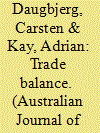

|
|
|
|
|
| Publication |
2014.
|
| Summary/Abstract |
The establishment of the World Trade Organization (WTO) has been widely accepted as representing the legalisation of world trading rules. However, it is important to reflect on the limits of this legalisation thesis in terms of the interface between international and domestic policy processes. By locating trading disputes in a political analysis of policy implementation, it is argued that it is difficult to establish conceptually how the WTO dispute settlement system could have authority separate from and above the conventional international politics of trade policy relations. Instead, the article argues that case outcomes should be expected to be largely the product of domestic political institutions and policy processes, and how these intersect with developments in the WTO dispute settlement system. Brief studies of the Australian government's dispute settlement strategy and two high-profile WTO disputes-the US upland cotton and European Union sugar cases-serve to suggest that the authority of international trade law is not as significant as assumed by the legalisation thesis. Rather, domestic politics and institutions have an important impact on the outcome of trade disputes.
|
|
|
|
|
|
|
|
|
|
|
|
|
|
|
|
| 7 |
ID:
127351
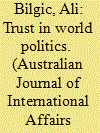

|
|
|
|
|
| Publication |
2014.
|
| Summary/Abstract |
In the discipline of international relations, the concept of trust has been theorised in two ways: the 'rationalist' approach and the 'normative' approach. This article aims to show that these approaches do not adequately reflect how trust operates in world politics and that trust provides a new way of understanding the identity-security nexus in international relations. It is argued that as actors learn to trust each other, this trust-learning process has a transformative effect on their definition of self-interests and identities. The elaborated understanding of trust in the security dilemma is operationalised in terms of the immigration security dilemma.
|
|
|
|
|
|
|
|
|
|
|
|
|
|
|
|
| 8 |
ID:
127352
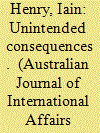

|
|
|
|
|
| Publication |
2014.
|
| Summary/Abstract |
The Howard government's foreign policy objectives concerning East Timor remain the subject of intense historical debate. Given that some Indonesians harbour suspicions about Australia's role in East Timor's independence, it is important to reflect on Australia's diplomacy throughout this period. This article draws on 15 interviews with former politicians and officials-including Prime Minister John Howard and Foreign Minister Alexander Downer-to argue that in 1998, Australia's foreign policy was focused on supporting Indonesia's democratisation process and maintaining the bilateral relationship. It was only when Indonesia moved towards a 'special status' of autonomy for East Timor that Australia reconsidered its own position. Although rarely acknowledged, Australia's policy shift actually precipitated outcomes that it had sought to avoid. As such, Habibie's decision to allow self-determination in East Timor can only be viewed as an unintended consequence of Australian diplomacy-independence was never the objective of Australian foreign policy.
|
|
|
|
|
|
|
|
|
|
|
|
|
|
|
|
|
|
|
|
|